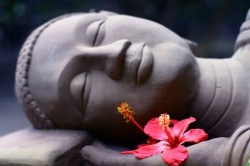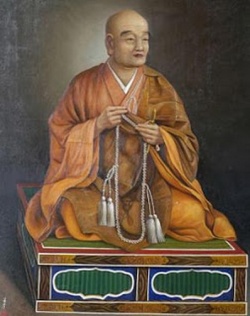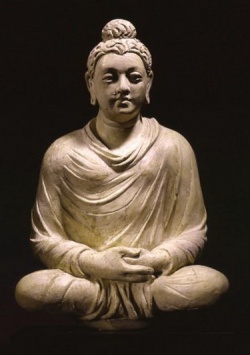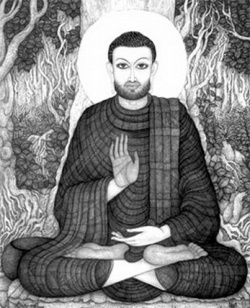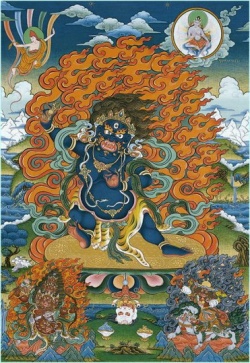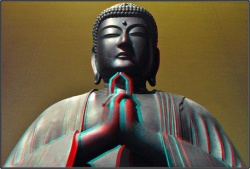Describing The Substance
</poem>
The Second of the Five-fold Profound Meanings is Describing the Substance. Once you know a person’s name, you learn to recognize him on sight. “Is he fat or thin, tall or short?” You don’t necessarily have to see his face, but can recognize him by his form. “Oh, it’s him.”
This Sutra is a Mahayana Dharma, spoken without request, and takes the Real Mark as its substance. The Real Mark is no mark. There is no mark, nothing at all, and yet there is nothing which is not marked. Unmarked, it is true emptiness, and with nothing unmarked, it is wonderful existence.
All marks are the Real Mark:
The Real Mark is unmarked
With nothing unmarked.
It is without marks and also without any non-marks It is neither without marks nor is it marked by no marks. While in the midst of marks, one should not hold onto marks, for they are not the Real Mark. True Suchness, the one true Dharma Realm, the Thus Come One’s Store Nature, all are different names for the Real Mark.
Clarifying the Principle
Unless you understand the Sutra’s doctrine and objective, you will not understand its principles. So now we will examine the one by means of the other. It is just like knowing a person’s name and then discovering his occupation. The principles of this Sutra are Faith, Vows, and Practice- Holding the Buddha’s name; these are the three prerequisites of the Pure Land Dharma-door. One who goes on a journey takes along some food and a little money. One who wishes to go to the Land of Ultimate Bliss needs faith, vows, and the practice of holding the Buddha’s name.
Faith is the first prerequisite, for without it one will not make the vow to be born with Amitabha in the Pure Land of Ultimate Bliss, and thus will not realize the objective of this Sutra. You must have faith in Yourself, The Land of Ultimate Bliss, Cause and Effect, and Noumena and Phenomena.
What does it mean to believe in oneself? It is to believe that you certainly have the qualifications necessary to be born in the Land of Ultimate Bliss. You should not take yourself lightly and say, “I have committed so many offenses, I can’t be born there.” If you have heavy offense karma, you now have a good opportunity to take it with you to the Land of Ultimate Bliss. Regardless of the offenses you have committed in the past, if you change your mind and reform your conduct, you may be born there, offenses and all.
Taking your karma to the Pure Land refers to past karma, however, not to future karma. Once you have understood the Dharma, offenses should cease. If you continue to offend, you will absolutely not be reborn in the Land of Ultimate Bliss. You may recite the Buddha’s name and bow to the Buddha, but you will only be making investments in future Buddhahood. You will not, in this life, be born in the Land of Ultimate Bliss because you clearly understood and yet deliberately violated the rules of the Dharma. Before taking refuge with the Triple Jewel, doing things which are not in accord with the Dharma may be excusable, but to continue such behavior after taking refuge increases the gravity of one’s offenses. Knowing your error, you must truly change your faults and say, “I most certainly can be reborn in the Land of Ultimate Bliss.”
Secondly, you must have faith in the Western Land of Ultimate Bliss which is hundreds of thousands of millions of Buddhalands from here. Before he realized Buddhahood, Amitabha Buddha, as the Bhikshu Dharma Treasury, vowed to create a land where living beings who recited his name could be born. There’s no need to do anything else; it’s easy, simple, and convenient. It doesn’t cost a thing, and yet this Dharma-door is the highest and most supreme, for if you just recite, “Namo Amitabha Buddha,” you will be born in the Land of Ultimate Bliss.
It is also necessary to believe in cause and effect, to believe that in the past you have planted good roots which have caused you to encounter this Dharma-door of Faith, Vows, and Holding the Buddha’s Name. Without good roots, no one can encounter this, or any other Dharma-door. But, just as in planting the fields, if a farmer doesn’t nourish and irrigate the fields, he won’t reap the The Buddha Speaks of Amitabha Sutra – The Five-fold Profound Meanings fruit. So believe that in the past you have planted the causes of Bodhi which in the future will bear the fruit of Bodhi if you just nourish the root.
You may think, “You tell me to believe in cause and effect and to believe that I have good roots, but, frankly, I don’t think I do.” How can you tell whether or not you have good roots? People often ask me to tell them whether or not they have good roots, but I tell them to tell me if I have good roots. They say, “I don’t know if you do,” and I answer them, “then how should I know about you?” But I do have a method to teach you how to find out. You have met the Buddhadharma because you have good roots; without them you would not have had this opportunity.
“Granted, I have met the Buddhadharma,” you say, “but is it possible that I have no good roots?” If you lack them, plant them. If you don’t plant them you will never have any! Whether or not you have good roots is no great problem. The question is whether or not you will plant and nourish them by cultivating according to Dharma. For example, the Buddhadharma teaches you not to drink, but you would risk your life to do it. Drunk, with your head confused and your eyes bleary, your brain feels as if it were going to split open.
This is to walk down the road of stupidity. The Buddhadharma teaches you not to steal, but even if your life were not at stake, you’d steal. One who truly cultivates according to Dharma does not lie, drink, steal, kill, or commit acts of sexual misconduct. Obey the Buddha and refrain from evil. Do not think that minor faults are unimportant, for it’s just the minor faults that drag one into the hells or into the paths of hungry ghosts or animals. Believe, then, that you have good roots and that in the future you will reap the fruit of Bodhi. Finally, one must have faith in the phenomena and the noumena of the Amitabha Sutra.
The specific phenomena is this: Amitabha Buddha has a great affinity with us and will certainly guide us to Buddhahood. The noumenal principle is this: We know the great affinity exists because without it we would not have met the Pure Land Dharma-door. Amitabha Buddha is all living beings and all living beings are Amitabha Buddha. Amitabha Buddha became Amitabha Buddha by reciting the Buddha’s name, and if we recite the Buddha’s name, we, too, can become Amitabha Buddha. We should cultivate according to the phenomenal and the noumenal principles. The Avatamsaka Sutra speaks of four Dharma Realms:
1) The Dharma Realm of Unobstructed Phenomena, 2) The Dharma Realm of Unobstructed Noumena, 3) The Dharma Realm of Noumena and Phenomena Unobstructed, 4) The Dharma Realm of All Phenomena Unobstructed. Considering the four Dharma Realms, and speaking from the standpoint of our self-nature, we and Amitabha Buddha are united in one, and therefore we have the qualifications to realize Buddhahood. The phenomenon has a mark and a manifestation. It is conditioned. The noumenon is the doctrine underlying any phenomenal event. For example, in principle a tree has the potential to become a house. Before the house is built, it has that noumenal aspect. Once built, the house itself is the phenomenon, which appears because of the noumenon. In principle, we can all realize Buddhahood, but we have not phenomenally done so. If we have Faith, Vows and Hold the Name, we will arrive at the phenomena of Buddhahood, just as the tree can be made into a house. Amitabha Buddha is contained within the hearts of all living beings and living beings are contained within Amitabha’s heart. This is the phenomenon and the noumenon. You must believe in the doctrine and energetically practice it by reciting the Buddha’s name more and more every day.
When one recites “Namo Amitabha Buddha,” in the Western Land of Ultimate Bliss, in one of the pools of the seven jewels filled with the eight waters of merit and virtue, a lotus flower grows. The more one recites, the bigger it grows, but it won’t bloom until the end of life, when one’s self-nature goes to be reborn in it. If you wish to know whether you will be born in a superior, middle, or inferior grade of lotus, you should ask yourself how often you recite the Buddha’s name. The more you recite, the bigger the lotus; the less you recite, the smaller. If you don’t recite at all, the lotus withers and dies.
To be reborn in the Land of Ultimate Bliss, you must personally give proof to the result with deep faith, firm vows, and actual practice of recitation. It won’t work to think, “I’ll sleep-in today and cultivate tomorrow.” If, however, you hold fast to the name and cultivate vigorously, success is certain. Vows Having discussed faith, we will now discuss vows. What is a vow? What you wish16, the tendency of your thoughts, is a vow. In Buddhism there are four great vows: I vow to save the limitless living beings. I vow to cut off the inexhaustible afflictions. I vow to study the immeasurable Dharma-doors. I vow to realize the supreme Buddha Way. All Buddhas and Bodhisattvas of the past, present, and future practiced the Bodhisattva conduct and attained Buddhahood by relying on these four great vows. 16. The Chinese word for vow, yuan , also means “to wish” or “to want.”
You may make the four great vows according to the Four Holy Truths. According to the truth of suffering, I vow to save the limitless living beings. According to the truth of origination, I vow to cut off the inexhaustible afflictions. According to the truth of the Way, I vow to study the immeasurable Dharma-doors. According to the truth of extinction, I vow to realize the supreme Buddha Way. The four great vows come from an awareness of the suffering of living beings. For purposes of clarification, suffering is divided into groups of the three, eight, and limitless sufferings. According to the truth of origination, I vow to cut off the inexhaustible afflictions:
The three sufferings are:
1) Suffering within suffering. This is the poverty and misery of all living beings. 2) The suffering of decay. Living beings may enjoy wealth and honor, but it eventually goes bad. 3) The suffering of process. Even without the sufferings of poverty and decay, the bitterness of the life-process from birth, to the prime of life, to old age and then to death is still suffering. The shift and change of each passing thought is called the suffering of process.
The eight sufferings are:
1) The suffering of birth. 2) The suffering of old age. 3) The suffering of sickness. 4) The suffering of death. It was because Shakyamuni Buddha met with these four sufferings that he decided to leave the home-life and cultivate the Way. 5) The suffering of separation from what you love. 6) The suffering of being joined with what you hate. If people are not apart from loved ones, they are involved with enemies. If you don’t like someone, you’ll find someone just like him wherever you go. 7) The suffering of not realizing aspirations. You worry about getting something and once you have it you worry about losing it. This suffering is nothing compared to the next: 8) The suffering of the raging blaze of the five skandhas: form, feelings, perceptions, impulses, and consciousness. The five skandhas are like a raging fire. They are a constant shadow which we cannot escape.
According to the truth of suffering, I vow to save the limitless living beings: Why are there limitless sufferings besides the eight? In the past lives we planted the seeds of suffering as if they were old friends with which we were loathe to part. Having established causes and conditions for suffering in the past, in the present we reap a bitter fruit. From causes made in lives gone by comes your present life;
Results you’ll get in lives to come arise from this life’s deeds. Plant good causes, reap good results; Plant bad causes, reap bad results. You fear the results. “Oh, I’m suffering too bitterly,” you say, but you suffer because previously you planted the causes of suffering. Living beings fear the results, not the causes from which they come, but Bodhisattvas fear the causes, not the results. Bodhisattvas are extremely careful not to plant the causes of suffering and so they do not reap the harvest of suffering. They endure their present suffering gladly. So Bodhisattvas, too, must sometimes suffer, but they do so willingly, knowing that Enduring suffering ends suffering;
Enjoying blessings destroys blessings.
Living beings, on the other hand, are not afraid to plant the causes of suffering. “Good causes, bad causes, it doesn’t matter,” they say, “I’ll do it anyway. It’s not important.” But when the results come, “Oh! I can’t stand it,” they moan. “How could this happen to me? Such bitterness!” If you fear suffering you should not plant the causes of suffering, for if you do, you will certainly reap its bitter fruit. Born in the Land of Ultimate Bliss, one endures no suffering but enjoys every bliss. None of the three sufferings, eight sufferings, or the limitless sufferings are found there at all. The people are pure and free of greed, hatred, and stupidity. Without the three poisons there are no evil paths of rebirth because the evil paths are but manifestations of the poisons.
The Buddha saves living beings, but in reality there is not a single living being that he saves. He resolves to lead everyone to understand the Buddhadharma in order to leave suffering, attain bliss, and wake up. But when you take beings across, do not become attached to the mark of taking beings across. Take living beings across, but be apart from marks. Leave marks, yet take beings across.
Do not attach to some mark or sign of what you do and say, “Let’s see, I’ve saved three, four….six, seven… at least ten living beings!” If you keep count, you’ve still got attachments. Save, yet do not save;
Do not save, yet save: This is true crossing over. You must save the living beings within your own self-nature as well as those outside. There are eighty-four thousand living beings in your self-nature. Teach them to cultivate, realize Buddhahood, and enter Nirvana.
If you decide to save living beings, you will encounter afflictions; if you don’t save them, you will also have afflictions. Either way you will have afflictions because there are eighty-four thousand kinds of affliction. There are three delusions:
1) Delusions of views and thought. 2) Delusions like dust and sand. 3) Delusions of ignorance.
Living beings have all three types of delusions. Those of the Small Vehicle have cut off the delusions of views and thought, but retain the delusions like dust and sand and the delusions of ignorance. Bodhisattvas have cut off both the delusions of views and thought and the delusions like dust and sand, but they still have delusions of ignorance. Even Bodhisattvas at the stage of Equal Enlightenment who are just about to realize Buddhahood, still have one particle of “production-mark” ignorance as fine as a hair which they have not yet destroyed. This particle once destroyed, they attain the Wonderful Enlightenment of Buddhahood. The delusion of views refers to greed and love for externals. Because external objects are not viewed as empty, they are recognized as real. Clothing, food, and sleep seem very real. “It’s true,” you say, “I’m all alone.
I have no friends or relatives.” This confused state is the delusion of views. Not understanding what you see, you are greedy for comfort and “good” things. “I love this and I love that,” you say, and your endless love keeps you dissatisfied and greedy for externals. This is the delusion of views. The delusion of thought consists in being confused about principles and giving rise to discrimination. “I don’t know what’s going on here,” someone says. “Is the Dharma Master right? If I do what he says, what’s in it for me?” You constantly calculate about personal advantage, and, if there’s nothing in it for you, you don’t want to do it. You can’t see more than three inches beyond your face. Anything four inches away you cannot see. Thought delusions are unclear, muddled thoughts, taking what is wrong as right, and what is right as wrong.
I just said that people with view delusions think clothing, food, and sleep are real. Someone may ask if they are false, and, if so, then what is true? These things are all necessities, but if you attach no importance to them, you are relaxed and free. Whenever there is attachment, there is pain. If you take it all as unreal, there will be no greed or love, and you will see that your former greed and love were nothing but confused actions in a dream. You should think of them in this way; put everything down; let it all go. If you can’t put it down, you’re attached, and nothing goes right. There are eighty-eight parts to the delusion of views and eightyone parts to the delusion of thought. When the delusion of views is destroyed, you certify to the first fruit of Arhatship. If not, there is no certification.
Do you have greed and love for externals? Are you greedy for “good” things and repulsed by the bad? “Absolutely not,” you say.
How do you know you are not? If you really didn’t love the good and hate the bad you wouldn’t know it. If you say, “I know for certain that I have no greed or love,” then your greed and love is greater than anyone else’s. Why? Because you know that you have none. If you really had none you wouldn’t know that you didn’t. If you say that you have no self, how do you know that you have no self? Knowing that you have no self, you still have your “self.” If you say that you have no greed or love, you still have a self and you haven’t cut off the eighty-eight parts of the delusion of views and you haven’t certified to the first fruit of Arhatship. It is not simply a matter of saying it and making it so. You must truly attain this state.
The delusion of views contains the five quick servants and the delusions of thought contain the five dull servants. The five dull servants are greed, hatred, stupidity, pride and doubt. The five quick servants are said to be “quick” because they arrive very fast. The five dull servants arrive more slowly. The Five Quick Servants are: 1) The view of a body. Because one is attached, one thinks, “This is my body, and I’m so thin! I’m not eating right, I’m not properly dressed, and I don’t have a decent place to live. How can I take care of my body?” Attached to the body and holding a view of a body, one schemes for it all day long.
2) The view of extremes. To become attached to either of the two extreme views of permanence or annihilation is to indulge in this view. Attached to annihilation, one says, “People die, and that is that. Everything returns to emptiness.” Attached to permanence, one says, “Next life I’ll be a person again. People are always people and dogs are always dogs. Cats are always cats, horses are always horses, trees are always trees, grass is always grass. People can’t become cats and cats can’t turn into people. People can’t turn into animals or ghosts. This is the fixed, eternal, unchanging principle: permanence.” Annihilation and permanence are extreme views; they are not the Middle Way. 3) Deviant views. Those with deviant views say that when one does good there is no good retribution and when one does evil there is no evil retribution. They deny cause and effect and do not believe that by doing good deeds one obtains blessings and by doing evil deeds one incurs disaster.
4) The views of restrictive morality. This is to take a nonexistent cause for a true cause; for example, teaching others to imitate the conduct of dogs and cats, or to imitate cows and eat grass instead of food. Having seen a dog or cat reborn in the heavens one may want to imitate a dog or cat and thereby hold deviant knowledge and views. Sometimes people who have left the home-life are attached to keeping the precepts. “I hold the precepts,” they brag. “I am a precept-holder and these are the precepts I hold.” Because there is a “holder” and “that which is held” they do not understand that the basic substance of morality is empty. They shouldn’t have attachments, but they do, and this turns into this servant. 5) The view of grasping at views. Here, a non-existent effect is taken to be a true effect. The non-ultimate is considered to be ultimate. The four Dhyanas or the four stations of emptiness are mistaken for Nirvana. a) In the first Dhyana, the pulse stops. b) In the second Dyana, the breath stops. One sits without breathing, but if one thinks, “I’m not breathing,” then the breath starts up again. c) In the third Dhyana there is no thought. In the first and second, although there is neither pulse nor breath, thinking continues. In the third, there isn’t even any thought. d) In the fourth Dhyana, there isn’t any fine thought, only consciousness. In the third Dhyana, although there is no The Buddha Speaks of Amitabha Sutra – The Five-fold Profound Meanings 38 coarse thought, fine thought remains. In the fourth, fine thought is also cut off. These are just states; they are not the ultimate goal of cultivation, which is certification to the fruit. Even the four stations of emptiness:
a) The station of infinite space, b) The station of infinite consciousness, c) The station of nothing whatever, and d) The station of neither perception nor non-perception, are not certification to the fruit. They are simply levels of samadhi. Those who hold the view of grasping at views think that the above-mentioned states are Nirvana, like the untutored Bhikshu who mistook the fourth Dhyana heaven for the fourth fruit of Arhatship. When the merit which had enabled him to dwell there was used up and he started to fall, he slandered the Dharma, and because of this he fell into hell. The five quick servants are the delusion of views and are called “quick” because they arrive quickly.
Referring to the delusion of thought and arriving more slowly are the Five Dull Servants:
1) Greed. 2) Hatred. 3) Stupidity. 4) Pride. 5) Doubt.
Afflictions come from ignorance. When the delusions of ignorance arise, delusions like dust and sand follow. The delusions like dust and sand are called the delusions of “I don’t know” because there is no genuine knowledge. The delusions of views and thought are called the delusions of “I don’t see.” Ignorance turns into the first of the five dull servants, greed. When you want something, greed arises, and with it come all the various afflictions. The afflictions turn into hatred, and you argue on your own behalf, never seeing the other person’s side. You only know yourself and are unaware that other people exist, except in attempting to ruin them. In this way, reckless and unreasonable, you become stupid, unable to tell black from white, right from wrong.
Stupid people are arrogant, and no matter what you say they doubt it. They doubt the truth and doubt the false even more. All these doubts are the delusions of thought. The three categories of delusions, those of views and thought, dust and sand, and ignorance, all change into affliction. Afflictions are inexhaustible and endless. Observing this, cultivators vow: According to the truth of Origination, I Vow to cut off the inexhaustible afflictions.
According to the truth of the Way, I vow to study the immeasurable dharma doors:
To cultivate the Way, you must understand all of the limitless and unbounded Dharma-doors, which are the methods of cultivation. Unless you understand them, you cannot cultivate. Relying on the third Holy Truth, the Way, vow to study them. What is the origin of the Dharma-doors? The Buddhas spoke all dharmas for the minds of men.
If there were no minds, What use would dharmas be? All dharmas come from the minds of living beings, and each mind is unique. Since no two minds are alike, all Dharma-doors The Buddha Speaks of Amitabha Sutra – The Five-fold Profound Meanings 40 differ. Generally speaking, however, there are three classes of dharmas:
1) Buddhadharma 2) Mind-dharma 3) Dharma of living beings.
Within the three classes arise the Four Holy Truths, the Six Perfections, the Twelve Causes and Conditions, and the Thirty- Seven Limbs of Enlightenment. So many Dharma-doors! Take, for example, my explanations of the Sutras. When I finish explaining one Sutra, I begin another, and no sooner have I finished that one, than I start yet another. Isn’t this measureless? What we now study is like a drop of water in the sea. We certainly haven’t got the entire ocean. Vow to master the immeasurable Dharmadoors. “What are the advantages of studying the Buddhadharma?” you ask. “It’s a lot of trouble, you know.”
We study the Buddhadharma because we want to realize Buddhahood. “But isn’t wanting to realize Buddhahood just another false thought?” No, it’s not a false thought. Buddhahood was our position to begin with; it is our origin. Consequently, everyone can realize Buddhahood, and we should hurry up and do just that. “But how?”
According to the truth of extinction, I vow to Realize the supreme Buddha Way: The truth of extinction is the attainment of Nirvana, a realization which carries one beyond production and extinction. If this attainment is your wish, resolve to cultivate the supreme Buddha Way. Don’t be skeptical and ask, “Can I really become a Vows
Buddha?” Even if you have doubts, you can become a Buddha; it will take a little longer, that’s all. Without doubts you can do it right away. All living beings have the Buddha nature and all can realize Buddhahood. But this does not mean that all beings are Buddhas. To arrive at Buddhahood you must cultivate, for without cultivation living beings are just living beings, not Buddhas. In principle, everyone can become a Buddha, but unless you cultivate according to Dharma and rid yourself of greed, hatred, stupidity, pride, and doubt, you won’t become a Buddha very fast. This completes the discussion of the four vast vows.
If you wish to accomplish something, you should first make a vow. Then act upon it. In this way you will naturally attain your aim. This principle is illustrated by the following story: Once, Shakyamuni Buddha and his disciple Mahamaudgalyayana went with a large gathering of followers to another county to convert living beings. When the citizens saw the Buddha they shut their doors and ignored him. When they saw Maudgalyayana, however, they ran to greet him, and everyone, from the King and ministers to the citizens, all bowed and competed to make offerings to him. The Buddha’s disciples thought this most unfair. “World Honored One,” they said, “your virtuous conduct is so lofty; why is it they do not make offerings to you, but instead compete to make offerings to Maudgalyayana?”
“This is because of past affinities,” said the Buddha. “I will tell you…”
“…Limitless aeons ago, Maudgalyayana and I were fellow countrymen. He gathered firewood in the mountains and I lived in a hut below. A swarm of bees was bothering me and I decided to smoke them out. But Maudgalyayana refused to help even though they stung him until his hands were swollen and painful. Instead, he made a vow, ‘It must be miserable to be a bee,’ he thought. ‘I vow that when I attain the Way I will take these asura-like bees across first thing!’ “Many lifetimes later the bees were reborn as the citizens of this country. The queen bee became the King, the drones became the ministers, and the workers became the citizens. Because I didn’t like the bees, I now have no affinity with these people and therefore no one makes offerings to me. But, because of his vows, all the citizens revere Maudgalyayana.” Considering this, we should certainly make vows to establish affinities in order to benefit living creatures.
Practice: Holding The Name When the water-clearing pearl is tossed in muddy water, The muddy water becomes clear. When the Buddha’s name enters a confused mind,
The confused mind attains to the Buddha. This Sutra takes Faith, Vows, and Holding the Name as its doctrine. Having discussed Faith and Vows, we shall now discuss Holding the Name. Reciting the Buddha’s name is like throwing a pearl into muddy water so that the muddy water becomes clear. This clear-water pearl can purify even the filthiest water. Recitation of the Buddha’s name is like this pearl.
Who can count the false thoughts which fill our minds and succeed one another endlessly like waves on the sea? When the Buddha’s name enters a confused mind, the confused mind becomes the Buddha. Recite the name once and there is one Buddha in your mind; recite it ten times and there are ten Buddhas, recite it a hundred times and there are a hundred Buddhas. The more you recite, the more Buddhas there are. Say, “Namo Amitabha Buddha,” there’s a Buddha-thought in your mind. When you are mindful of the Buddha, the Buddha is mindful of you. It’s like communication by radio or radar. You recite here, and it’s received there. But if you don’t recite, nothing is received; so you must hold and recite the name. In the Dharma-ending age, recitation of the Buddha’s name is a most important Dharma-door. Don’t take it lightly.
Everytime Dhyana Master Yung Ming Shou, the Sixth Patriarch of the Pure Land School, recited the Buddha’s name, a transformation Buddha came out of his mouth. Those with the Five Eyes and Six Spiritual Penetrations could see it. When you recite the Buddha’s name, you emit a light which frightens all weird creatures and strange ghosts away. They run far, far away and leave you alone. So the merit and virtue of holding the Buddha’s name is inconceivable. Holding and reciting the Buddha’s name, you should, as it says in The Doctrine of the Mean, “grasp it tightly in your fist.” Do not let it go. Thought after thought, recite the name. There are four methods of reciting.
1) Contemplating and thinking Buddha-recitation. 2) Contemplating an image Buddha-recitation. 3) Real Mark Buddha-recitation. 4) Holding the name Buddha-recitation.
The first, contemplating and thinking Buddha recitation, consists of the contemplation of Amitabha Buddha: Amitabha Buddha’s body is of golden hue, His fine marks radiant beyond compare.
His white light is as high as five Mount Sumerus, His purple eyes as clear and vast as four great seas. Countless transformation Buddhas appear within the light, With transformation Bodhisattvas, also limitless. His forty-eight vows take living beings across; In nine grades of lotuses they ascend to the other shore.
Amitabha Buddha’s appearance is the result of the perfection of his merit and virtue. He has all of the 32 marks and the 80 minor characteristics of a Buddha and his bright light is incomparable. Between his eyebrows there are fine white beams of light as big as five Mount Sumerus, and his eyes are as large as four great seas. How big do you think his body is? There are nine grades of lotuses:
1) Superior superior 2) Superior middle 3) Superior inferior 4) Middle superior 5) Middle middle 6) Middle inferior 7) Inferior superior 8) Inferior middle 9) Inferior inferior
Each of the nine grades also has nine ranks, making 81 in all. Living beings in all of these grades are led to the other shore- Nirvana. The second kind of Buddha-recitation, contemplating the image, consists of making offerings to an image of Amitabha Buddha and reciting his name while contemplating it. Contemplate, and in time you will have success.
When you achieve the third, Real Mark recitation, even if you try, you cannot stop reciting the Buddha’s name. The recitation flows like water and lives within you. This is the state of the Buddha-recitation samadhi: reciting and yet not reciting, not reciting and yet reciting. The fourth kind of Buddha-recitation is that of holding the name. Both moving and still, one recites, “Namo Amitabha Buddha.” Recitation must be clear and distinct and the three karmas of body, mouth, and mind must be pure. The mouth is free from the four evil karmas of
1) abusive language, 2) profanity, 3) lying, and 4) gossip, and the body is without the three evil karmas of 5) killing, 6) stealing, or 7) sexual misconduct. The minds has no 8) greed, 9) hatred, or 10) stupidity.
When one is free of the ten evil deeds, then the karma of body, mouth, and mind is pure. In this way, one thought pure is one thought of the Buddha; when every thought is pure, every thought is of the Buddha.
The pure heart is like the moon in the water; The mind in samadhi is like the cloudless sky. If you can recite so completely that you enter the Buddharecitation samadhi, then hearing the wind, it’s “Namo Amitabha Buddha,” and hearing the rain, it’s “Namo Amitabha Buddha.” Every sound you hear recites the Buddha’s name. The water flows, The wind blows, Proclaiming the Mahayana… The Chinese poet Su T’ung P’o said, Of the colors of the mountain, None are not his vast, long tongue. Of the sounds of the streams, All are the clear, pure sound. All the mountain’s colors are the Buddha’s long tongue proclaiming the wonderful Dharma. This is the attainment of the Buddha-recitation samadhi. So I wrote this verse: If you recite the Buddha’s name, reciting without cease, The mouth recite “Amita” and makes things of a piece. Scattered thoughts do not arise, samadhi you attain. For rebirth in the Pure Land, your hope is not in vain. If all day you detest the suffering Saha’s pain, Make rebirth in Ultimate Bliss your mind’s essential aim. Cut off the red dust thoughts within your mind. Put down impure reflections, and pure thoughts you will find.
Recite the Buddha’s name from morning to night and your confused thoughts will not arise. You will naturally attain the Buddha-recitation samadhi and be reborn in the Land of Ultimate Bliss, according to your will. You know that the Saha world is full of pain and suffering; so cut off worldly pleasures and have no thoughts of sexual desire, craving, or struggling for fame and profit. Put down all worldly concerns and view them as false. Seek rebirth, ultimate bliss; this thought of rebirth is extremely important. The verse clearly explains the principles of reciting the Buddha’s name. Holding and reciting the name is like picking up something in your hand and never letting it go. Recite “Namo Amitabha Buddha” every day and chase out your scattered thoughts.
This Dharma-door fights poison with poison. False thinking is like poison, and unless you counter it with poison, you will never cure it. Reciting the Buddha’s name is fighting false thinking with false thinking. It is like sending out an army to defeat an army, to fight a battle to end all battles. If you have a good defense, other countries won’t attack. Constant recitation drives out false thinking so that you may attain the Buddha-recitation samadhi. The third of the Five-fold Profound Meanings, then, is to take Faith, Vows, and Holding the Name as the doctrine. Discussing the Function
Discussing the Function. The fourth of the Five-fold Profound Meanings is to determine the Sutra’s power and use. Its power is that of “non-retreat” and its use is rebirth. Reborn in the Land of Ultimate Bliss, you attain to the stage of no retreat. Cultivators of other Dharma-doors are somewhat insecure; no one insures them. They may recite mantras or Sutras for several years and then retreat with a feeling of no accomplishment or gain. If not in this life, they may retreat in the next. Perhaps they are vigorous now, but later they take a rest. To say nothing of common people, even Arhats have the “confusion of dwelling in the womb” and forget their spiritual penetrations.
Bodhisattvas have the confusion called “splitting the yin,” which means the same thing. If they meet a good knowing advisor who teaches them to cultivate, they can wake up. Otherwise, life after life, they retreat and find it very hard to bring forth the Bodhi-heart again. It is easy to regress. Born in the Land of Ultimate Bliss, there is no back-sliding, just vigorous progress. One attains the four kinds of Non-retreat: 1) Non-retreating position. Born in the Land of Ultimate Bliss, you attain the Buddha-position. Born by transformation from a lotus, when the flower blooms, you see the Buddha, hear the Dharma, awaken to the unproduced dharma-patience, and never fall again.
2) Non-retreating conduct. Most people cultivate vigorously for one life, but in the next, they are lazy. In the Land of Ultimate Bliss there is none of the suffering of the three evil paths. The Kalavinka birds and two-headed birds all help Amitabha Buddha speak about the Dharma. Reborn there, one will no longer be lazy in conduct but will only go forward with courage and vigor. 3) Non-retreating thought. In the Saha world we cultivate vigorously, but after a time we feel it’s too bitter, too restrictive, too uncomfortable, and so we are no longer vigorous. Lazy thoughts arise and although we have not yet retreated in conduct, we have in thought.
Several decades pass quickly and thoughts of retreat greatly out-number those of vigor. It’s difficult not to regress. In the Land of Ultimate Bliss, one hears the Dharma spoken all day and all night long. One has no thoughts of retreat from the Bodhi-mind. All thoughts are irreversible. 4) Ultimate Non-retreat. Transformationally born from a lotus, you will never, under any circumstances, retreat again either to the level of a common person or to the Small Vehicle or Bodhisattva Determining the Teaching Mark level. Born in the Land of Ultimate Bliss you obtain these four kinds of Non-retreat. </poem>



